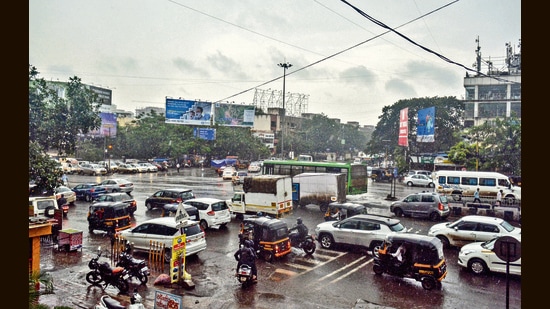Monday musings: Less law, more order; the story of ‘missing’ traffic police personnel
The police personnel who were supposed to be manning the traffic were missing. Their absence wasn’t for a day. It was prolonged – for almost more than a month
For the past month, Punekars had a different experience driving on the city roads.

The potholes that crop up every monsoon were the same; spots which used to be waterlogged earlier did not disappoint this time too; the traffic chaos assured that they are driving on Pune roads. What was different then?
The police personnel who were supposed to be manning the traffic were missing. Their absence wasn’t for a day. It was prolonged – for almost more than a month.
Their apparent ‘non-cooperation’ was after joint commissioner Sandeep Karnik had ordered to focus on disciplining traffic rather than taking penal action. Subsequently, the e-challan machines with traffic police were deposited at the deputy commissioner of police (DCP) traffic headquarters and police were asked to bring discipline to traffic, among their most important task given that people have often exhibited a lack of order on roads.
After Hindustan Times published a comprehensive report earlier this week with spot visits, the seniors in Pune police department ordered staff to be present on roads. But even for them, the order could have been restored only after e-challan machines were given back. Since when have e-challan machines become so important for traffic police?
In many ways, the traffic police on the duty have crucial responsibility even if they have been barred from collecting fines. The primary responsibility of traffic personnel is to make sure of a smooth flow of traffic on roads.
In India, the Motor Vehicles Act of 1988, which regulates vehicles and drivers empowers traffic police to discharge their duty and to serve the public by safeguarding their interests. The powers of traffic police also allow them to perform acts and checks to protect people.
Unfortunately, at most locations, the traffic police on duty were seen engaged in collecting fines (officially or unofficially) and issuing challans for traffic violations. On June 12, under fire after serious allegations of corruption and coercive penal action against residents, traffic police were stopped from collecting fines.
The job was left solely to the network of CCTV cameras in spotting traffic violations. There are around 1,250 CCTVs installed in various squares in Pune to monitor traffic violations and these gadgets have been doing their work more diligently than traffic police on the roads.
However, the directive of senior officials ordering the traffic police to stop fining commuters was interpreted differently at a lower level and staff who were supposed to be on the roads were missing from various spots even during peak hours when traffic flow was high. This was when the roster from the traffic department clearly showed deployment of constables at these spots.
Earlier in July, PMC was working overtime, digging roads to lay pipelines and rains made matters worse with potholes coming up everywhere, the least that people expected was the presence of traffic police to man the traffic.
The city is already witnessing major infrastructure-related work that is impacting the traffic on major roads. At the Katraj-Dehu stretch, the multi-level flyover work has been holding up traffic at Chandani chowk for the past year. Another flyover in the making has already made matters worse for Sinhgad residents, who are perennially stuck up in traffic jams. The Metro rail construction at various places including Ahmednagar road, and dug-up roads in peth areas are already making matters worse.
A little intervention from police at every key spot would have helped in easing the chaos and reducing overall traffic time.
The policing in India is less about law than about order. This is how it has always been in a nation whose population tends to anarchy, even when under self-rule. In a country of 1.3 billion people, the order is something that is often missing and has to be forced using a mandate.
This is exactly why police here are trained primarily for controlling the crowd rather than scientific investigation, a reflection of this is often seen in lower conviction rates or cases remaining undetected. Policing is carried out through “bandobast” when people are supposed to behave on their own. It’s also possibly because human behaviour, in reality, is not as rational.
So, till we discipline ourselves, police will need to play a bigger role on the roads to keep the traffic flowing smoothly.




